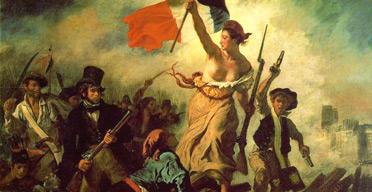| A | B |
|---|
| Montesquieu believed that government's power was best if | it included separation of powers |
| Based heavily on the writings of Montesquieu | American Constitution |
| Belief of Thomas Hobbes | the state must have central authority to manage behavior |
| Wrote Wealth of Nations | Adam Smith |
| This composer used the organ in his baroque compositions | Johann Sebastian Bach |
| Wrote operas like The Marriage of Figaro and The Magic Flute | Wolfgang Mozart |
| Jean-Jacques Rosseau argued that | people are good, but civilizations and institutions make them bad |
| Technological improvements made during the Enlightenment/Scientific Revolution and 18th century | Creation of all weather roads, new designs for farm tools, new designs for ship building |
| The theory which states that the earth revolves around the sun is called | heliocentric theory |
| This is another name for the Enlightenment | Age of Reason |
| Painted Liberty Leading the People | Eugene Delacroix |
| All of these were results of the Enlightenment | applied reason to human world not just natural world; stimulated religious tolerance; ideas fueled democratic revolution |
| Enlightenment ideas influenced revolutions where | France and Americas |
| These are all results of the Scientific Revolution | emphasis on reason and systematic observation of nature; scientific knowledge expands; formation of scientific method |
| This astronomer used the telescope to support the heliocentric theory | Galileo Galilei |
| He discovered theories of planetary motion | Johannes Kepler |
| This Englishman discovered the circulation of blood | William Harvey |
| These men were all composers | Bach, Mozart, Beethoven |
| Art of the Enlightenment showed | public events, landscapes, portraits |
| Political documents influenced by the Enlightenment include | Constitution, Bill of Rights, Declaration of Independance |
| French Enlightenment thinkers were called | philosophes |
| This philosophe advocated the separation of church and state, freedom of the press, and religious toleration | Voltaire |
| These were meeting places for the philosophes of Paris | salons |
| The first novel, titled Don Quixote, was written by | Miguel de Cervantes |
| This English political philosopher wrote Leviathan | Thomas Hobbes |
| This French philosophe wrote The Spirit of the Laws | Montesquieu |
| This English political philosopher is the author of Two Treatises on Government | John Locke |
| an economy characterized by competition, supply and demand, and the absence of government regulation | market economy |
| Beliefs of John Locke | His ideas include people are sovereign, people have the right to life, liberty and property and monarchs are not chosen by God |
| Written by Isaac Newton | Principia |
| Beliefs of Jean Jacques Rousseau | Government is a contract between rulers and the people, government receives its power from the people, and people should return to nature |
| Proposed earth and planets revolve around sun | Copernicus |
| Document written by Thomas Jefferson | Declaration of Independence |
| WD= Enlightenment | Period of the 18th century when scholars believed the use of reason could solve all problems |
| Thomas Jefferson based many ideas of the Declaration of whose writings | John Locke |
| Movement which changed the way people viewed the world and their place in it | Scientific Revolution |
| Believed absolute rulers were good because they kept order | Thomas Hobbes |
| New form of literature | novel |
| Believed in 3 branches of government | Baron de Montesquieu |
| Name the 3 branches of government | legislative, executive, judicial |
| Define laissez faire | economy will prosper if the government leaves it alone |
| Stimulated religious tolerance | Enlightenment |
| Absolute ruler who pledged to use Enlightenment ideas to cure society's problems | Enlightened despot |
| Believed government should leave the economy alone | Adam Smith |
Painted this,  | Delacroix,  |
| Belief that scientific research should proceed in an orderly manner through experimentation and observation | scientific method |
| Developed laws of motion, gravity and study of calculus | Isaac Newton |
| Believed man was evil | Thomas Hobbes |
| Wrote Fur Elise and 5th Symphony | Beethoven |
| Enlightenment thinkers believed what about humans | Men are born equal and deserve a voice in govt |
| Wrote Candide | Voltaire |
| Natural rights of John Locke | life, liberty, property |
| Invented telescope | Galileo |
| Most philsophes did not believe in this form of govt | Absolute monarchy |
| Believed people were sovereign and did not believe in theory of divine right | John Locke |
| Catholic church's role in Scientific Revolution | Opposed new discoveries and threatened scientists with excommunication |
| Effect of Scientific Revolution | emphasized reason and the systematic observation of nature |
| Sun, not earth is center of solar system | heliocentric theory |
| Global effect of Enlightenment | ideas caused democratic revolutions around world |
| WD=Scientific Revolution | Period of new scientific discoveries in the 16th and 17th centuries |
| Wrote The Social Contract | Rousseau |